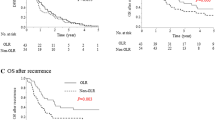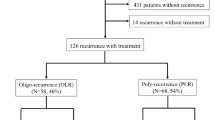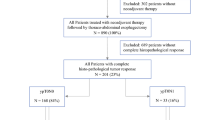Abstract
Background
Recurrent esophageal cancer after radical therapy usually is thought to be incurable and treated with palliative-intent systemic therapy. However, it is empirically known that surgical resection may be effective for selected patients, although no consensus exists on the efficacy of surgery for recurrent esophageal cancer. This study sought to identify a group of patients for whom surgical resection is considered effective.
Methods
The study enrolled 206 patients at a single center who had recurrence after radical therapy for esophageal cancer. Prognostic factors after recurrence were identified, and efficacy of surgery was analyzed according to whether the recurrent lesions were oligometastases (i.e., ≤ 5 lesions in a single domain) or not.
Results
In the multivariate analysis, oligometastatic presentation was the only factor associated with survival after recurrence (hazard ratio 6.29; 95% confidence interval, 4.10–9.71). The actuarial survival rates for the patients with oligometastases were 59.5% at 3 years and 51.7% at 5 years. The survival rates at 3 and 5 years were significantly higher for the patients who underwent resection (64.3% and 55.6%, respectively) than for those who did not (both 100%) and for the patients with multiple metastases (9.8% and 0%, respectively). The survival rates for the patients who had oligometastases without resection were comparably lower than for the patients with multiple metastases.
Conclusion
Oligometastatic presentation at recurrence was associated with better survival outcomes for the patients who experienced recurrence after radical treatment for esophageal cancer, and surgical resection could be a choice of treatment for this group of patients.



Similar content being viewed by others
References
Abate E, DeMeester SR, Zehetner J, et al. Recurrence after esophagectomy for adenocarcinoma: defining optimal follow-up intervals and testing. J Am Coll Surg. 2010;210:428–35.
Lee DH, Kim HR, Kim DK, Park SI, Kim YH. Outcomes of cervical lymph node recurrence in patients with esophageal squamous cell carcinoma after esophagectomy with 2-field lymph node dissection. J Thorac Cardiovasc Surg. 2013;146:365–71.
Hsu PK, Wang BY, Huang CS, Wu YC, Hsu WH. Prognostic factors for post-recurrence survival in esophageal squamous cell carcinoma patients with recurrence after resection. J Gastrointest Surg. 2011;15:558–65.
Port JL, Nasar A, Lee PC, et al. Definitive therapy for isolated esophageal metastases prolongs survival. Ann Thorac Surg. 2012;94:413–9.
Ghaly G, Kamel M, Nasar A, et al. Locally advanced esophageal cancer: what becomes of 5-year survivors? J Thorac Cardiovasc Surg. 2016;151:726–32.
Miyata H, Yamasaki M, Kurokawa Y, Takiguchi S, Nakajima K, Fujiwara Y, et al. Survival factors in patients with recurrence after curative resection of esophageal squamous cell carcinomas. Ann Surg Oncol. 2011;18:3353–61.
Bhansali MS, Fujita H, Kakegawa T, Yamana H, Ono T, Hikita S, et al. Pattern of recurrence after extended radical esophagectomy with three-field lymph node dissection for squamous cell carcinoma in the thoracic esophagus. World J Surg. 1997;21:275–81.
Yamashita H, Jingu K, Niibe Y, Katsui K, Matsumoto T, Nishina T, Terahara A. Definitive salvage radiation therapy and chemoradiation therapy for lymph node oligo-recurrence of esophageal cancer: a Japanese multi-institutional study of 237 patients. Radiat Oncol. 2017;12:38.
Patchell RA, Tibbs PA, Walsh JW, et al. A randomized trial of surgery in the treatment of single metastases to the brain. N Engl J Med. 1990;322:494–500.
Ghaly G, Sebron H, Mohamed KK, Mohamed R, Abu N, Jeffrey L, et al. Predictors of survival after treatment of oligometastases after esophagectomy. Ann Thorac Surg. 2018;105:357–362.
Kobayashi N, Kohno T, Haruta S, et al. Pulmonary metastasectomy secondary to esophageal carcinoma: long-term survival and prognostic factors. Ann Surg Oncol. 2014;21:365–9.
Diane KR, Kenneth JP. The biology and treatment of oligometastatic cancer. Oncotarget. 2015;6:8491–8524.
Allum WH, Stenning SP, Bancewicz J, et al. Long-term results of a randomized trial of surgery with or without preoperative chemotherapy in esophageal cancer. J Clin Oncol. 1987;27:5062–7.
Ando N, Kato H, Igaki H, et al. A randomized trial comparing postoperative adjuvant chemotherapy with cisplatin and 5-fluorouracil versus preoperative chemotherapy for localized advanced squamous cell carcinoma of the thoracic esophagus (JCOG9907). Ann Surg Oncol. 2012;19:68–74.
Nakamura K, Kato K, Igaki H, et al. Three-arm phase III trial comparing cisplatin plus 5-FU (CF) versus docetaxel, cisplatin plus 5-FU (DCF) versus radiotherapy with CF (CF-RT) as preoperative therapy for locally advanced esophageal cancer (JCOG1109, NExT study). Jpn J Clin Oncol. 2013;43:752–5.
Therasse P, Arbuck S, Eisenhauer E, et al. New guidelines to evaluate the response to treatment in solid tumors. J Natl Cancer Inst. 2000;92:205–16.
Eisenhauer E, Therasse P, Bogaerts J, et al. New response evaluation criteria in solid tumours: revised RECIST guideline (version 1.1). Eur J Cancer. 2009;45:228–47.
Japanese Esophageal Society. Japanese classification of esophageal cancer, 11th edition: parts II and III. Esophagus. 2017;14:37–65.
Sobin LH, Gospodarowicz MK, Wittekind C (eds). Oesophagus including oesophagogastric junction. In: TNM classification of malignant tumours. International union against cancer. West Sussex: Wiley-Blackwell; 2009. p. 66–72.
Kaneda H, Saito Y. Oligometastases: defines by prognosis and evaluated by cure. Cancer Treat Commun. 2015;3:1–6.
Mao YS, Suntharalingam M, Krasna MJ. Management of late distant metastases after trimodality therapy for esophageal cancer. Ann Thorac Surg. 2003;76:1742–3.
Author information
Authors and Affiliations
Corresponding author
Ethics declarations
Disclosure
There are no conflicts of interest.
Additional information
Publisher's Note
Springer Nature remains neutral with regard to jurisdictional claims in published maps and institutional affiliations.
Electronic supplementary material
Below is the link to the electronic supplementary material.
Rights and permissions
About this article
Cite this article
Ohkura, Y., Shindoh, J., Ueno, M. et al. Clinicopathologic Characteristics of Oligometastases from Esophageal Cancer and Long-Term Outcomes of Resection. Ann Surg Oncol 27, 651–659 (2020). https://doi.org/10.1245/s10434-019-08175-0
Received:
Published:
Issue Date:
DOI: https://doi.org/10.1245/s10434-019-08175-0




